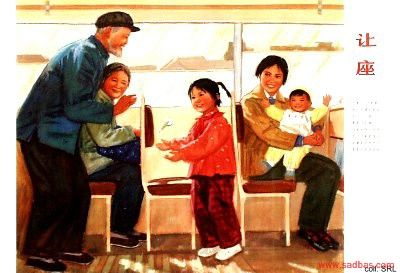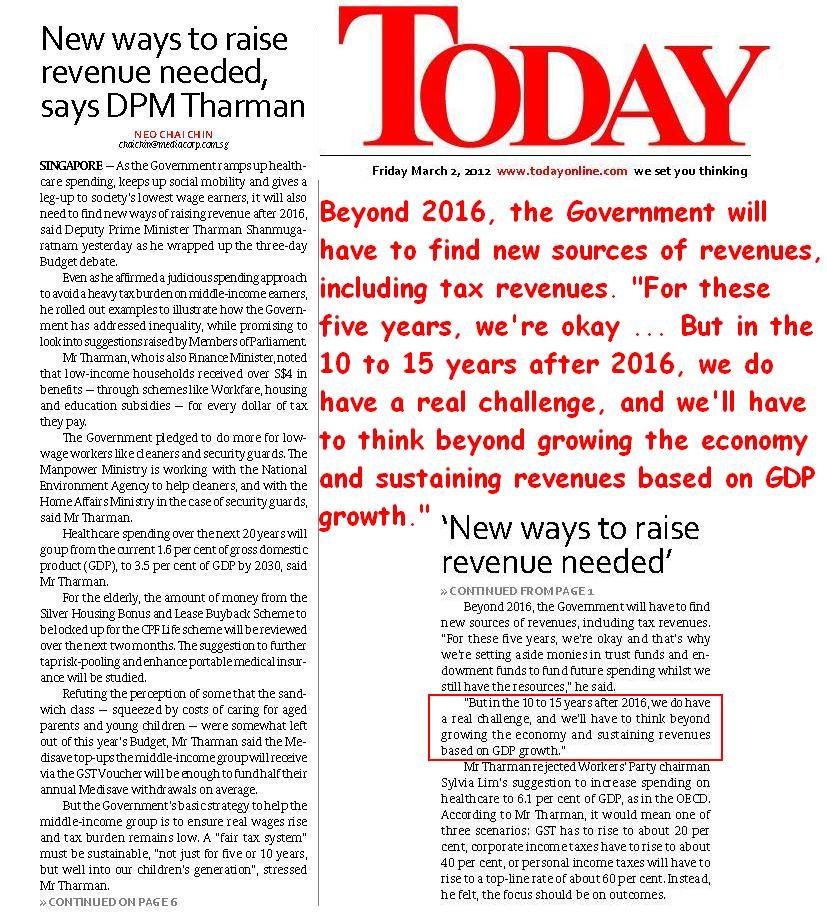How giving up one's seat on the bus to the needy can save our economy by reducing taxes for all.
 [Img Source: Girl Refuses To Give Seat To Disabled, Slapped By 100 RMB]
[Img Source: Girl Refuses To Give Seat To Disabled, Slapped By 100 RMB]
[PS, all references to either gender in this essay references the opposite equally]
On 1st March 2012, Deputy Prime Minister Tharman Shanmugaratnam, who is also Minister of Finance said: "For these five years, we're okay and that's why we're setting aside monies in trust funds and endowment funds... But in the 10 to 15 years after 2016, we do have a real challenge, and we'll have to think beyond growing the economy and sustaining revenues based on GDP growth." ('New ways to raise revenue needed, says DPM Tharman' [TODAY, 02Mar2012][pict])
Whilst on 8th June2012, at the Economic Society of Singapore's annual dinner, Prime Minister Lee Hsien Loong said "As we enhance our social safety nets, expenditure will inexorably rise, and revenue must keep up. Surely within the next 20 years, the government of the day will need new sources of revenue, which means raising taxes," ('Singapore's growth expected to slow in next decade' [CNA, 08June2012], [pict])
Imagine an elderly person of good character, going about his daily activities- basic marketing (grandpa), taking good care of grandchildren (grandma), doing some charity work at a nearby temple/ home for the elderly aged (help out with cooking/ cleaning/ admin etc), volunteering at the library reading story books to nursery children; for others, it might just be daily errands attending to a disabled spouse, part time work helping at a nearby medical facility or just moving about to keep active and fit. Can the love and nurturing provided by this elderly person for another ever be measured? Not earning a salary does not make this elderly a worthless person, for his contribution to society is indeed immense- no matter how slow and old fashioned his ideas may be.
Now imagine this same elderly person falling down on a crowded bus simply because someone feigned sleep to avoid the elder's need. The fall cost the elderly a broken hip and perhaps permanent immobility- this adverse result leading to depression and despair and immense stress to the rest of his family. All volunteering activities are cancelled- no more kind teacher, no more free storytelling, foreigners with language incompatibilities are hired to cover the part time duties once performed by the able elderly. Working adults become flustered given the sudden problem of taking care of another disabled family member, perhaps resulting in the government having to bear the cost of maintaining 2 immobile elderly in a state run welfare home. The next generation needless to say, is lost in the midst of this crisis and consequent financial disability. Can an economy of depressed individuals really be productive? Who can concentrate at work with problems at home so deep and unrelenting? Has anyone ever seen "social safety nets" large and strong enough to rescue a nation of depressed, unfriendly individuals?
According to 'Adding up the cost of elderly care' [The Telegraph.uk, 29Jun2011]: "One in three women and one in five men aged 65 and over will need to go into a residential care home... A single room in a private residential home in Britain now costs an average of £25,953 a year... One in four people will incur costs of more than £50,000 for elderly care and support such as home adaptations, meals on wheels and residential care... OECD projections suggest that the UK will be forced to spend an extra £50 billion a year on services for elderly people as the population ages over the next four decades."
Would the taxation liabilities towards providing for this indefatigable social safety net bankrupt the economy as governments uphold their pledges of inclusive societies going forward?
Please give up your seat to the elderly, help Singaporeans save some money, help save the Singapore economy.
 [Img source: 'giving-up-your-seat']
[Img source: 'giving-up-your-seat']
 [Img source: Respect Your Elders: 66-Year-Old Woman Breaks Student’s Nose For Not Giving Up Seat On Bus]
[Img source: Respect Your Elders: 66-Year-Old Woman Breaks Student’s Nose For Not Giving Up Seat On Bus]



[PS, all references to either gender in this essay references the opposite equally]
On 1st March 2012, Deputy Prime Minister Tharman Shanmugaratnam, who is also Minister of Finance said: "For these five years, we're okay and that's why we're setting aside monies in trust funds and endowment funds... But in the 10 to 15 years after 2016, we do have a real challenge, and we'll have to think beyond growing the economy and sustaining revenues based on GDP growth." ('New ways to raise revenue needed, says DPM Tharman' [TODAY, 02Mar2012][pict])
Whilst on 8th June2012, at the Economic Society of Singapore's annual dinner, Prime Minister Lee Hsien Loong said "As we enhance our social safety nets, expenditure will inexorably rise, and revenue must keep up. Surely within the next 20 years, the government of the day will need new sources of revenue, which means raising taxes," ('Singapore's growth expected to slow in next decade' [CNA, 08June2012], [pict])
Imagine an elderly person of good character, going about his daily activities- basic marketing (grandpa), taking good care of grandchildren (grandma), doing some charity work at a nearby temple/ home for the elderly aged (help out with cooking/ cleaning/ admin etc), volunteering at the library reading story books to nursery children; for others, it might just be daily errands attending to a disabled spouse, part time work helping at a nearby medical facility or just moving about to keep active and fit. Can the love and nurturing provided by this elderly person for another ever be measured? Not earning a salary does not make this elderly a worthless person, for his contribution to society is indeed immense- no matter how slow and old fashioned his ideas may be.
Now imagine this same elderly person falling down on a crowded bus simply because someone feigned sleep to avoid the elder's need. The fall cost the elderly a broken hip and perhaps permanent immobility- this adverse result leading to depression and despair and immense stress to the rest of his family. All volunteering activities are cancelled- no more kind teacher, no more free storytelling, foreigners with language incompatibilities are hired to cover the part time duties once performed by the able elderly. Working adults become flustered given the sudden problem of taking care of another disabled family member, perhaps resulting in the government having to bear the cost of maintaining 2 immobile elderly in a state run welfare home. The next generation needless to say, is lost in the midst of this crisis and consequent financial disability. Can an economy of depressed individuals really be productive? Who can concentrate at work with problems at home so deep and unrelenting? Has anyone ever seen "social safety nets" large and strong enough to rescue a nation of depressed, unfriendly individuals?
According to 'Adding up the cost of elderly care' [The Telegraph.uk, 29Jun2011]: "One in three women and one in five men aged 65 and over will need to go into a residential care home... A single room in a private residential home in Britain now costs an average of £25,953 a year... One in four people will incur costs of more than £50,000 for elderly care and support such as home adaptations, meals on wheels and residential care... OECD projections suggest that the UK will be forced to spend an extra £50 billion a year on services for elderly people as the population ages over the next four decades."
Would the taxation liabilities towards providing for this indefatigable social safety net bankrupt the economy as governments uphold their pledges of inclusive societies going forward?
Please give up your seat to the elderly, help Singaporeans save some money, help save the Singapore economy.


Last edited:
